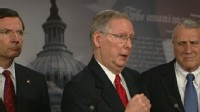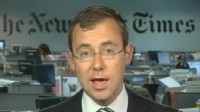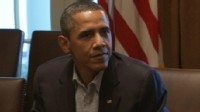WASHINGTON July 14, 2011 (AP)
With time growing short and warnings more dire, the first, fragile signs emerged Thursday of a possible compromise to raise the nation's debt limit and avert a potentially catastrophic default on Aug. 2.
Under a plan discussed by the Senate's top two leaders, President Barack Obama would receive enhanced authority to raise the debt ceiling at the same time procedures would be set in motion that could lead to federal spending cuts.
Word that Majority Leader Harry Reid, D-Nev., and Republican leader Mitch McConnell of Kentucky were at work on the fallback plan came as Obama and congressional leaders held a fifth straight day of debt-crisis talks at the White House.
McConnell pronounced the session a good one. "We're going to continue to discuss a way forward over the next couple of days and see what happens," he said.
Obama was having his say on Friday, scheduling his second White House news conference of the week.
House Republicans and Democrats scheduled closed-door meetings of the rank and file to review the spending cuts and tax increases proposed by one side or the other so far.
Charles Dharapak/AP Photo
President Barack Obama meets with... View Full Size
Debt Ceiling Looms, Budget Battle Rages Watch Video
Jeff Zeleny: Both Sides Further Apart on Debt Deal Watch Video
Debt Showdown: President Says It's Decision Time Watch Video
After weeks of political turmoil, it appeared attempts to avoid a default were proceeding along two tracks — the White House negotiations that appeared near an end, and the fallback that officials said privately presented the stronger opportunity to avert a crisis.
One Republican, speaking on condition of anonymity, said that in the White House talks so far, negotiators had agreed on about $1.5 trillion in deficit cuts, far less than the $2.4 trillion or so needed to meet Obama's demand that the debt limit go up enough to tide the Treasury over through the 2012 elections.
A summary that House Majority Leader Eric Cantor, R-Va., prepared for the talks earlier in the week showed the bulk of cuts coming from day-to-day operating budgets of federal programs.
Also included were as much as $245 billion from Medicare, including higher premiums for wealthier beneficiaries, and additional savings from skilled nursing homes and home health care. The summary indicated that federal workers would pay more for their pensions, agriculture subsidies would be cut and food stamp spending would be restrained.
Two officials said Cantor did not speak during the day's session, after irritating Obama on Wednesday by repeatedly proposing a short-term debt limit increase the president has vowed to veto.
Attempts by Democrats to include higher taxes were rejected by Republicans, as expected.
One Democratic official said GOP negotiators declined to consider closing corporate tax loopholes in order to pay for a one-year extension of the payroll tax cut approved last winter.
The day's events were shadowed by warnings from Federal Reserve Chairman Ben Bernanke and JPMorgan Chase CEO Jaime Dimon. Speaking separately, the two men admonished bickering lawmakers that failure to avoid an unprecedented default could have a devastating effect on an already anemic U.S. economy.
Adding to the urgency, Moody's Investor Service has announced it is reviewing America's bond rating for a possible downgrade. In a separate announcement, the credit rating agency Standard & Poor's warned that there is a 50 percent chance it will downgrade the government's credit rating within three months because of the impasse.
There was growing concern overseas, too. A Chinese rating agency, Dagong Global Credit Rating Co., also advised of a possible downgrade, and Chinese Foreign Ministry spokesman Hong Lei said: "We hope that the U.S. government adopts a responsible policy to ensure the interests of the investors."
It was unclear when McConnell and Reid might unveil their legislation, or whether they would first present their ideas to Obama and others involved in the daily meetings at the White House.
McConnell said the plans had not been discussed in depth at Thursday's White House session, which lasted less than 90 minutes.
One option under discussion by the Senate leaders is creation of a group of lawmakers who could recommend spending cuts, possibly including changes in benefit programs, that would be guaranteed a yes-or-no vote in Congress.
Another would be to invite the House to add spending cuts to the legislation, to take effect as soon as Obama requested more borrowing authority, including some that have emerged in private talks led first by Vice President Joe Biden, and now by Obama.
The seriousness of the situation was underscored throughout the day.
Testifying before a Senate panel, Bernanke said a default would deal a "self-inflicted wound" to the nation's economy, driving up interest rates and slowing recovery from the deep recession.
Dimon, speaking to reporters in New York, said default could prove catastrophic. "Why take that chance? I wouldn't take that chance," he said, answering his own rhetorical question.
Talks have been stymied by a dispute over tax increases as part of any deal to cut future deficits. Obama and Democrats want them, while Republicans don't.
The concept under discussion by the Senate leaders is a more elaborate version of a plan McConnell suggested earlier in the week to a less-than-enthusiastic reception from conservatives.
In his first substantive remarks on McConnell's initial suggestion, Speaker John Boehner told reporters, "What may look like something less than optimal today, if we're unable to get an agreement might look pretty good a few weeks from now."
White House press secretary Jay Carney said if there was no progress toward a bipartisan agreement on cuts by Friday, "then we have to begin looking at making sure that we fulfill our obligations to uphold the credit rating of the United States."
He did not elaborate.
Whatever choice was made, it was clear time was running out.
Treasury Secretary Timothy Geithner met privately at the Capitol with Senate Democrats, emerging to say: "We have no way to give Congress more time to solve this problem."
So the alarms covered a broad front: Geithner is a senior official in the Obama administration, Bernanke is the nation's central banker and Dimon the head of one of Wall Street's best-known firms.
Similar warnings have been directed at lawmakers repeatedly since Geithner announced that Aug. 2 was essentially the day of reckoning. The Treasury has been relying on unusual measures since early May to avoid breaching the current debt ceiling, which stands at $14.3 trillion.
Boehner also took steps during the day to present a common front with Cantor, his second-in-command, who has seemed at times to take a dominant role in the White House talks.
Reid criticized Cantor in unusually personal remarks on the Senate floor, saying he "has shown he shouldn't be at the table."
Cantor brushed aside the criticism, and Boehner came to his defense at a news conference. "We have been in this fight together," he said, placing his arm around Cantor's shoulder, adding that any report that the Virginian has been "anything less than helpful is just wrong. ... We're in the foxhole."
Cantor and other members of the party leadership balked several days ago when Boehner privately shared details of a possible sweeping deal with Obama that could have meant higher taxes. The speaker announced he would no longer pursue the plan.
Apart from his role in the White House talks, Cantor staged a high-profile walkout from an earlier set of negotiations led by Biden, irritating some Democrats who noted the talks were near an end anyway.




No comments:
Post a Comment